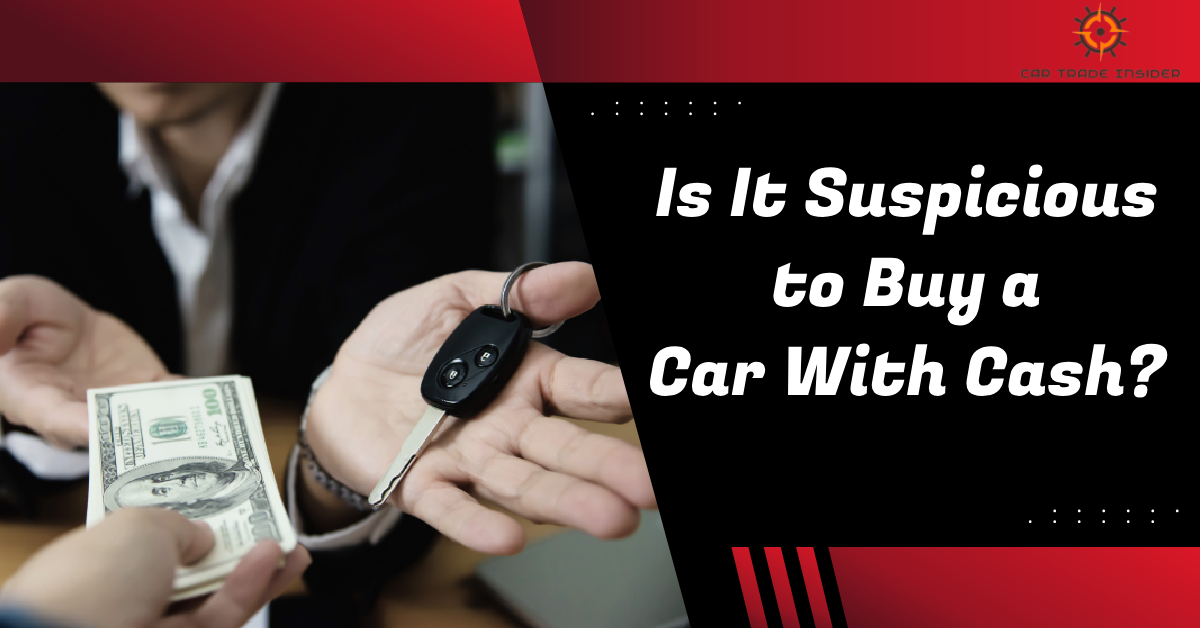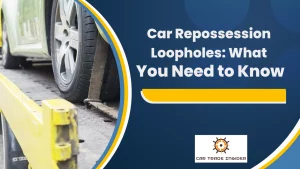Buying a car with cash can raise suspicions because it can be difficult to track the source of the money. This can be a red flag for illegal activity, such as money laundering or tax evasion.
However, not all cash purchases are suspicious. For example, someone may be paying cash because they have good credit and don’t want to pay interest on a loan.
In a world where credit cards and financing options seem to dominate the automotive landscape, the idea of purchasing a car with cash might raise a few eyebrows.
This article delves into the intriguing question: Is it suspicious to buy a car with cash? We’ll uncover the motivations behind cash purchases, discuss their pros and cons, explore potential suspicions, and provide tips on navigating this mode of transaction.
Why Might Someone Want to Buy a Car With Cash?
Buying a car with cash offers a sense of financial freedom and immediate ownership. Many individuals prefer to avoid monthly payments, interest rates, and the long-term commitment that comes with traditional financing.
What Are the Pros and Cons of Buying a Car With Cash?
Pros:
- Financial Freedom: When you buy a car with cash, you eliminate ongoing payments, interest, and debt, providing you with a sense of financial freedom.
- Negotiation Power: Cash buyers often have stronger negotiation leverage. Having cash on hand can help you secure a better deal on the vehicle’s price.
- No Credit Checks: Purchasing a car with cash means you won’t need to undergo credit checks or provide extensive documentation to secure financing.
- Immediate Ownership: With a cash purchase, you become the sole owner of the vehicle right away, without any lienholders or financial obligations.
- Lower Car Insurance Premiums: Some insurance companies offer lower premiums for cars that are paid for in cash, potentially saving you money on insurance costs.
- Staying within Your Budget: Paying with cash makes it easy to stay within your budget since you can only spend the money you have available.
- Getting discounts: A few car dealerships might lower the price if you pay with cash, but it depends on the lender.
Cons:
- Reduced Liquidity: Making a large cash outflow for a car purchase can impact your overall financial liquidity and limit your immediate spending capability.
- Limited Car Options: Opting for a cash purchase may limit your choices to more affordable vehicles within your available budget.
- Missed Investment Opportunities: Spending a lump sum on a car might mean missing potential investment growth that could have been generated from that money.
- Missed Financing Offers: Some dealerships offer special financing deals, such as zero-interest loans, which are typically available only to individuals with good credit.
- Limited Return Policy: Check the return policy carefully when paying with cash, as some dealerships might have restrictions on returns for cash transactions.
- Credit History Building: Buying a car with cash does not contribute to building a credit history. If you don’t already have credit established, this could be a missed opportunity.
Why is It Suspicious to Buy a Car With Cash?
There are several reasons why buying a car with cash can be considered suspicious.
1. The source of the money
Cash is often used to conceal the source of income, which can be a red flag for illegal activity. For example, drug dealers or other criminals may use cash to purchase cars to avoid detection by law enforcement.
2. The risk of counterfeit money
Counterfeit money is a growing problem, and dealerships are often on the lookout for it. A large cash payment is more likely to be counterfeit than a smaller one.
3. The possibility of money laundering
Money laundering is the process of making illegally-gained money appear legitimate. Cars can be a valuable asset for money launderers, as they can be easily bought and sold without raising suspicion.
4. The lack of buyer information
When a car is purchased with cash, the dealership may not have as much information about the buyer as they would if the car was financed. This can make it more difficult to track down the buyer if something goes wrong.
It is important to note that not all cash payments for cars are suspicious. However, dealerships are required to report any cash payments of $10,000 or more to the government, so it is important to be aware of this if you are planning to pay cash for a car.
Tips to Avoid Raising Suspicion
Purchasing a car with cash can sometimes raise eyebrows, but with the right approach, you can navigate the process smoothly and avoid unnecessary suspicions. Here are some practical tips to help you make a cash purchase without any hassles:
- Transparent Communication: Dealerships may inquire about the source of your cash and the reasons for paying in cash. Respond openly and honestly, providing clear explanations that alleviate any doubts.
- Honesty is the Best Policy: If you’re choosing a cash payment due to factors like bad credit or to bypass interest charges, communicate this to the dealership. Honesty builds trust and minimizes suspicion.
- Consider Alternative Payment Methods: Opt for a cashier’s check or money order instead of physical cash. This not only adds legitimacy to the transaction but also reduces the risk of counterfeit money concerns.
- Form 8300 IRS Reporting: When making a cash purchase exceeding $10,000, dealerships are required to fill out Form 8300 to report the transaction to the IRS. This procedure helps track transaction activities and enhances transparency.
Understanding the $10,000 Rule
The Bank Secrecy Act established the $10,000 rule, mandating individuals or businesses to report transactions exceeding $10,000 to the IRS using Form 8300. This rule helps prevent financial impropriety and ensures transparency. Dealerships are responsible for submitting these reports without causing undue alarm.
The $10,000 rule should not evoke fear or apprehension. Legitimate sources of money have nothing to hide. Don’t be hesitant to have the dealership file Form 8300. This action not only complies with the law but also demonstrates your commitment to transparent financial practices.
Upon filing, the IRS notifies local, state, and national authorities to track the flow of money. This process safeguards legitimate transactions and contributes to a secure financial environment.
Why Car Dealerships don’t Like Card Payments
Car dealerships often hesitate to accept payments through debit or credit cards, and there are good reasons behind this practice. Let’s explore these reasons to gain a better understanding:
1. Transaction Fee Concerns
One significant challenge dealerships face when processing card payments is the transaction fee. This fee can range from 0.8% to 5% depending on the issuing bank. Imagine you’re purchasing a $20,000 car, and the swipe fee is 1%. In this scenario, the dealership needs to pay a fee of $200. This added expense affects their overall profit margin.
2. Limitations on Card Transactions
Debit and credit cards often come with transaction limitations that can impact car purchases. These limits, typically around $3,000 per transaction and $5,000 per day, can hinder large purchases like cars.
3. Waiting Time for Payment Processing
Car dealerships may experience delays in receiving payment when processing card transactions. Banks take time to process and reflect transactions in the account, which can take one to two days. Dealerships, aiming to maintain efficient operations, often prefer to avoid such waiting periods.
4. Implications of Card Payment Refunds
Refund policies associated with card payments add another layer of concern for car dealerships. Credit card payments allow for chargebacks within 60 to 90 days. This creates a situation where a buyer could dispute the transaction and return the purchased car, resulting in immediate depreciation for the dealership, especially if the car is brand new.
Looking for more information about paying with a card, check out this trending article on Can I buy a car with a debit card?
Ensuring Safety When Buying a Car for Cash
Buyer’s Safety Measures
- Documentation: Keep a thorough record of all transactions, including dates, agreed prices, payment methods, and ownership transfer details. Maintaining both physical and digital records ensures clarity and accountability.
- Meeting Point: Opt for a public place to meet sellers, such as a busy shopping mall, police station parking lot, or bank. Avoid secluded areas to ensure safety for both parties.
- Bring a Companion: Having a friend, family member, or security guard accompany you adds a layer of security and deters potential thieves.
- Bill of Sale: Ensure the seller signs the bill of sale, a document that records the car sale and payment details.
- Report to DMV: Reporting the sale to the Department of Motor Vehicles (DMV) helps ensure proper registration of the vehicle under the new owner’s name.
Seller’s Safety Measures
- Form 8300 Reporting: For cash deposits exceeding $10,000, file Form 8300 with the IRS. This assists authorities in tracking cash flow and verifying authenticity.
- Meeting Safety: Always meet buyers in public places. Avoid any request to meet in unfamiliar or suspicious locations.
- Prompt Deposits: Once you receive cash payments, deposit them in the bank promptly to minimize risk.
- Backup Documents: Keep copies of ownership documents to address any potential disputes in the future.
- Safe Banking: Safeguard your bank statements and maintain a record of received payments.
- Cash Verification: Before handing over the car, inspect and verify the cash amount to ensure it matches the agreed-upon price. Don’t sign the car title until you have received the agreed-upon cash amount.
- Buyer’s Identification: Collect identification from the buyer, such as a driver’s license or passport, for future reference if needed.
How To Buy A Car With Cash?
Buying a car with cash offers a straightforward approach, bypassing loans and monthly payments. It empowers you to adhere to your budget and safeguards your savings. To ensure a smooth transaction, consider these tips:
Step 1. Set Your Budget
Setting your budget is the crucial first step on this journey. Your budget will determine the type of car you can afford and the payment method that suits you best.
For instance, if you’re eyeing a $12,000 car and have two years to save, that’s just $292 per month. This approach puts you in control of your payments and ensures you’re financially prepared.
Step 2. Find a Car You Like
With a budget in mind, start exploring your options. Avoid the temptation of higher-end models and stick to what you can afford. Remember, a certified pre-owned car can be just as reliable as a brand-new one. Extensive research on make, model, engine size, and gas mileage will empower you when it’s time to make a decision.
Websites like Edmunds, Kelley Blue Book, and CarFax provide valuable information for your research phase.
Step 3: Identify a Reputable Dealer
Start by identifying the best car dealerships that accept cash payments. Investigate their reputation through customer reviews and recommendations. Reputable dealerships provide guidance and fair deals. Specialty dealerships can be a great option for specific car models.
Step 4: Effective Price Negotiation
Negotiating the price effectively is key. Equip yourself with market knowledge through car ranking reviews and research. Window shopping at various dealerships helps you gauge average prices. Be confident but remain open to agreement. Arrive at a fair price that suits both parties. When negotiating the price, employ these strategies for a successful purchase:
- Compare Other Models: Exploring alternative models helps you stay within budget while enjoying desired features.
- Avoid Buying Extras: Dealers may suggest unnecessary add-ons. Evaluate each carefully and consult your car insurance provider for cost insights.
- Ask for the Price front: Seeing the price first empowers you during negotiations. If financing, withhold your preferred payment range.
- Consider No-Haggle Pricing: Some dealerships offer fixed, no-haggle prices. While convenient, explore all options to ensure the best deal.
Step 5: Keep Payment Evidence
Collect payment evidence such as receipts and a bill of sale from the dealer. This documentation proves the transaction and safeguards against future issues. The bill of sale includes essential information like the transaction date, car details, and ownership transfer. Ensure the dealer submits IRS Form 8300 for cash payments exceeding $10,000.
Additional Steps for a Smooth Transaction
- Choose Safe Payment Methods: For purchases over $10,000, opt for safer payment methods like a cashier’s check. This eliminates the need to carry large sums of cash and ensures secure transactions.
- Complete Paperwork: Attend to necessary paperwork, including registration, taxes, and tags. Dealerships often handle this for you, while private sales may require your attention.
- Thorough Inspection: Before finalizing the deal, thoroughly inspect the car with a mechanic’s help. This ensures that the vehicle is in good condition and devoid of major issues.
- Vehicle Identification: Keep the car’s identification documents, such as the title and VIN, safe and accessible.
FAQs
What are the criminal penalties for not filing Form 8300?
Failure to file can lead to criminal charges. Criminal penalties, including fines and imprisonment, can be imposed for intentional non-compliance with IRS Form 8300.
Who needs to file IRS form 8300?
Businesses involved in cash transactions over a certain threshold must file this form.




